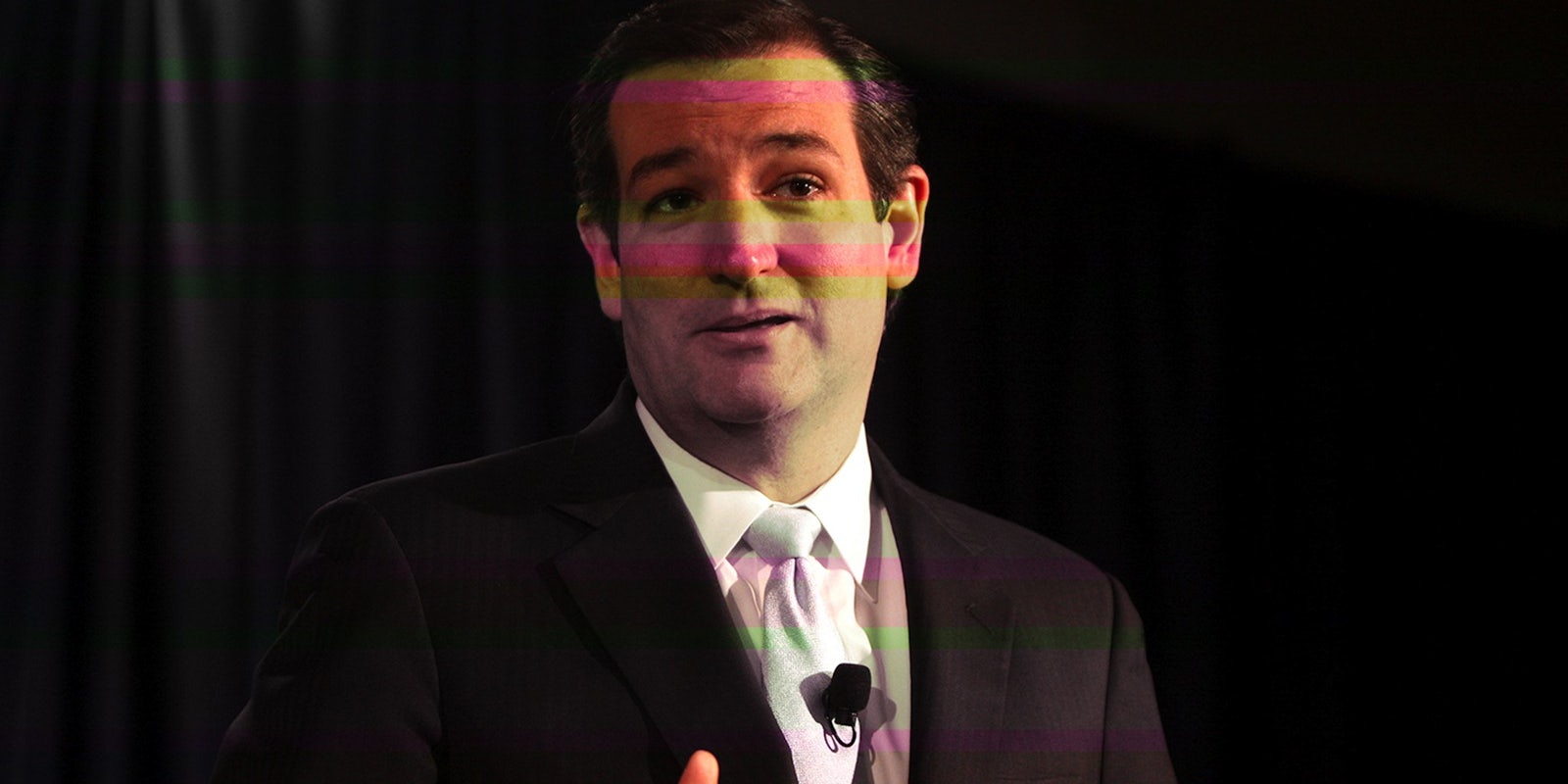Pundits predicted a showdown between Republican presidential frontrunner Donald Trump and Texas Sen. Ted Cruz at Wednesday night’s debate—and the two candidates lived up to expectations.
It began when debate moderator Neil Cavuto asked Cruz whether or not he was a U.S. citizen.
“The U.S. Constitution says only natural born citizens are eligible for the office of President of the United States,” Cavuto said. “Stop me if you’ve heard this before. You were born in Canada to an American mother, so you…are considered an American citizen. But, that fellow next to you, Donald Trump, and others have said that being born in Canada means you are not naturally born. That has raised questions about your eligibility. Do you want to try to close this topic once and for all tonight?”
“I’m glad we’re focusing on the important topics of the evening,” Cruz responded, eliciting laughs from the audience.
The comment, a jab at the moderators, hearkened back to a strategy Cruz employed to great effect in earlier debates—bashing the media. During a debate in October, Cruz elicited the biggest spike of the night in social-media conversations when he attacked the CNBC moderators’ questions as distractions from serious policy matters.
Then Cruz hit Trump.
“Back in September, my friend Donald said he had his lawyers look at this form every which way and there was no issue there,” Cruz continued. “There was nothing to this birther issue. Since September, the constitution hasn’t changed, but the poll numbers have. And I recognize that Donald is dismayed that his poll numbers are falling in Iowa but…the law here…[is] really quite clear. Under longstanding U.S. law, the child of a U.S. citizen born abroad is a natural born citizen. If solider has a child aboard, that child is a natural born citizen. that’s why John McCain, even though he was born in Panama, was eligible to run for president.”
Sen. John McCain (R-Ariz.), the party’s 2008 nominee, was born in Panama, but his situation was slightly different. McCain was born on an American military base inside the Panama Canal Zone, which was then an unorganized territory of the United States. As such, McCain’s claim of being a “natural-born citizen,” as the Constitution puts it, are significantly clearer than Cruz’s.
When McCain was running for president in 2008, the Senate passed a bipartisan resolution affirming his eligibility to serve in the Oval Office. Cruz, who is considerably less popular than McCain among his Capitol Hill colleagues on both sides of the aisle, has conspicuously not received a similar resolution. When asked about Cruz’s eligibility earlier this month, McCain himself refused to answer definitively.
“At the end of the day, the legal issue is quite straightforward,” Cruz said. “But I would note that the birther theories that Donald has been relying on, some of the more extreme ones insist that you must not only be born on U.S. soil, but have two parents born on U.S. soil.”
“Under that theory,” he continued, “not only would I be disqualified, [Florida Sen.] Marco Rubio would be disqualified, [former Louisiana Gov.] Bobby Jindal would be disqualified and, interestingly, Donald J. Trump would be disqualified because Donald’s mother was born in Scotland. On the the issue of citizenship, Donald, I’m not going to use your mother’s birth against you.”
Cruz delivered this straw-man argument with the effortless skill of a college debate champion, and the audience ate it up.
Trump responded by insisting polls still showed him with a significant lead in Iowa. Citing an op-ed by Harvard Law School constitutional law professor Laurence Tribe, Trump charged that the unresolved question of Cruz’s Canadian birth could present problems for the party in the the general election.
“Attorneys that feel…that because he was not born on the land, he cannot run for office,” Trump said. “Here’s the problem: We’re running, he does great, I win, [and] I choose him as my vice presidential candidate, and the Democrats sue because we cannot take him along for the ride.”
As the audience jeered, Trump continued: “They don’t like that. They don’t like that he beats the rest of the field because they want me. If, for some reason…he beats the rest of the field, I already know the Democrats are going to be bringing a suit. You have a big lawsuit over your head while you’re running and if you become the nominee, who the hell knows if you can serve in office. So you should go out and get a declaratory judgment, let the courts decide.”
Cavuto asked Trump why he was bringing up the issue now, and Trump agreed with Cruz—it was because Cruz had recently shot up in the polls, and Trump “didn’t care before…[because Cruz] never had a chance.”
“I’ve spent my entire life defending the Constitution before the U.S. Supreme Court, and I’m not going to be taking legal advice from Donald Trump,” Cruz replied. “The chances of any litigation success ding on this are zero.”
To turn the audience against Trump’s evidence, Cruz noted that Tribe represented former Vice President Al Gore in the Supreme Court battle over the counting of electoral ballots in Florida in 2000. Cruz was a lawyer for then-Texas Gov. George W. Bush’s team at the time.
“I’ll tell you what Donald, you very kindly a moment ago offered me the V.P. slot,” said Cruz. “I’ll tell you what. If this all works out, I’m happy to consider naming you as V.P., so if you happen to be right, you can get the top job at the end of the day.”
“I like that; I’d consider it,” Trump responded with a shrug. “But I think I’ll go back to building buildings if it doesn’t work out. But I have a feeling it’s going to work out, actually.”
Photo via Gage Skidmore/Flickr (CC BY 2.0) | Remix by Max Fleishman


